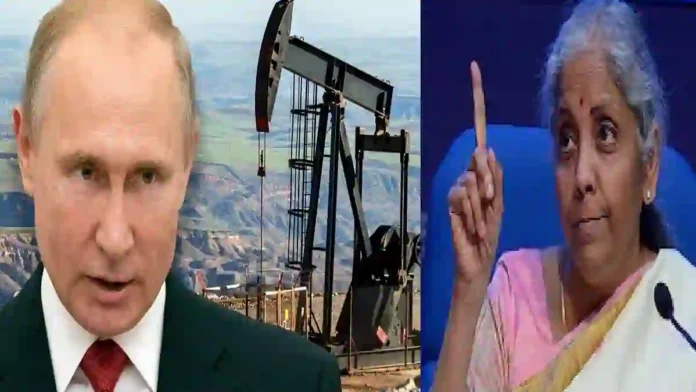India’s position on Russian oil imports was made crystal clear on Friday, with Union Finance Minister Nirmala Sitharaman reaffirming that purchases from Moscow will continue unabated, despite intensifying pressure from the United States. In an interview with News18, Sitharaman made a categorical statement that India would “undoubtedly be buying Russian oil,” stressing that such decisions are determined purely by national interest, economic affordability, and logistical viability.
She elaborated that crude oil, as a major component of India’s foreign exchange expenditure, directly influences the country’s import bill and energy security.
Read- India’s Next Indigenous Aircraft Carrier Likely To Be Nuclear Powered
Therefore, she argued, New Delhi must retain complete freedom in deciding its sources of oil supply, highlighting that Russian crude continues to offer rates and logistical options suited to India’s requirements.
Her comments come against the backdrop of sharp criticism from U.S. President Donald Trump, who on August 27 imposed a steep 50 percent import tariff on goods from India, arguing that New Delhi’s purchase of Russian oil indirectly fuels Moscow’s war in Ukraine.
Speaking earlier this week, President Trump escalated his warning by suggesting that Washington is prepared to roll out additional “Phase-2” and “Phase-3” tariffs targeting countries still maintaining significant trading activity with Russia.
He clarified that his measures are intended as sanctions against Russia’s economic backers, claiming that Indian energy purchases contribute “hundreds of billions of dollars” to Moscow.
In comments directed at India, Trump labelled New Delhi the second-largest buyer of Russian crude oil, after China, and implied that the country could face further penalties if it does not diversify its supply.
The President also sought to defend his own lack of direct punitive action against Russia since taking office in January, suggesting instead that secondary sanctions on India and other countries are an indirect way of debilitating Moscow’s economy.
Read- India’s Stealth Dilemma: The 5th-Gen Fighter Choice Before The IAF
Read- GE Engine Misses GE-F404 Engine Delivery Again; HAL Targets 180 Fighters By 2032
Responding to the fallout from Washington’s tariff regime, Sitharaman reassured industry stakeholders that the government is actively developing a policy package aimed at supporting sectors hit hard by the sudden 50 percent taxation barrier.
Without disclosing exact contours, she stated that relief measures would soon be announced to “handhold” affected exporters and manufacturers. These measures are expected to include direct assistance, tariff-adjustment schemes, and possibly incentives aimed at cushioning the blow of U.S. protectionism on Indian enterprises.
She argued that India’s domestic economic reforms, particularly the implementation of the Goods and Services Tax (GST), would offset many tariff concerns by creating greater internal fiscal resilience and a simplified taxation framework that makes domestic businesses more competitive.
Sitharaman’s remarks marks a clear divergence between New Delhi and Washington on the issue of energy security, highlighting India’s uncompromising stance that its crude import strategy will not be dictated externally.
India’s consistent argument has been that energy is a sovereign choice tied to national development, and affordable Russian oil provides a critical economic advantage amid global uncertainty.
With Trump’s statements opening the possibility of further sanctions, the coming months will test India’s ability to balance its strategic partnership with the U.S. while safeguarding its interests in securing cheap and reliable Russian oil.
The Finance Minister’s assertive remarks serve as both an assurance to domestic audiences that energy needs remain insulated from foreign diktats and a signal to Washington that India will not dilute its policy autonomy under external pressure.
Based On ANI Report
Agency




